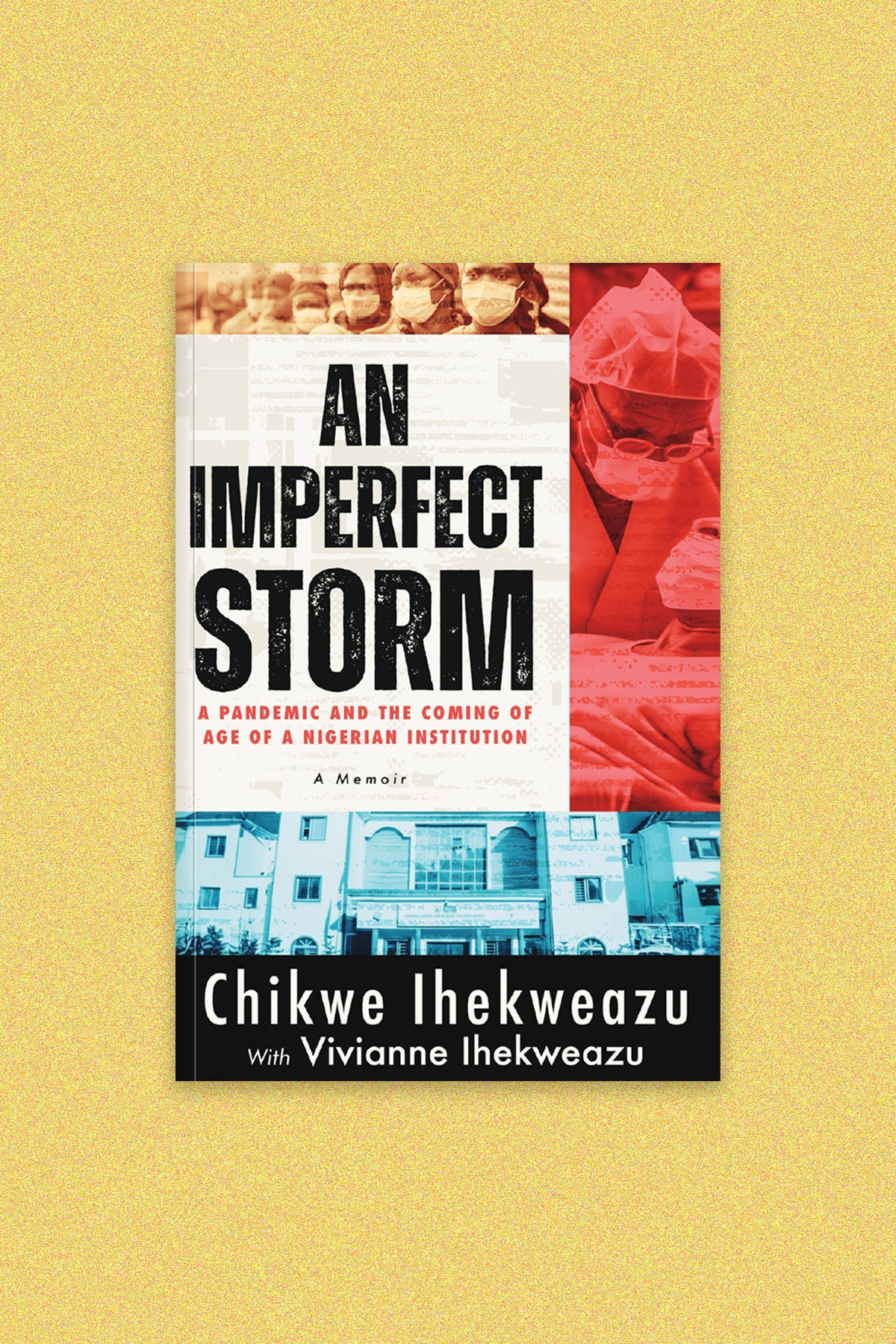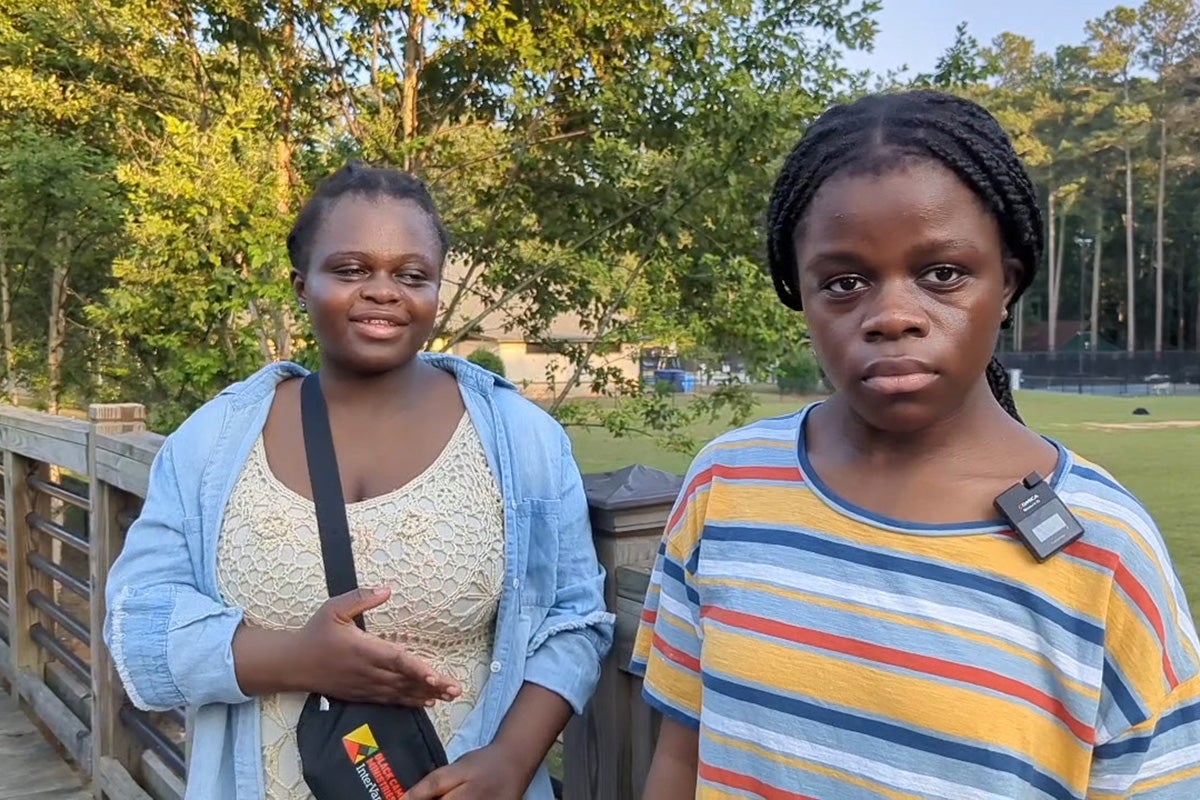
Book
The resilience playbook
Global health progress is often measured with indices and benchmarks, but these metrics overlook something crucial: the creativity and resilience employed to solve incredible problems, especially in places that are seen as “behind.” In An Imperfect Storm, Chikwe Ihekweazu offers a rare glimpse into the personal, professional, and institutional challenges he faced during the COVID-19 pandemic in Nigeria. His wife, Vivianne, a health communications expert who lead the watchdog group Nigeria Health Watch, also offers her view, from outside government, about the personal and professional challenges of the period—and her nevertheless unyielding optimism.
Their book not only captures the complexities of managing a public health crisis in Africa’s most populous country but also highlights the leadership and determination that drove Nigeria’s response.
Sign up for Harvard Public Health
Delivered to your inbox weekly.
Growing up in Nsukka, Nigeria, where his father worked as a doctor and his mother was a pioneering professor, Chikwe Ihekweazu was imbued early on with a deep respect for community service. He carried those values throughout his career, ultimately leading to his work as director of Nigeria’s Centre for Disease Control (NCDC).
An Imperfect Storm is not just about the pandemic; it is about a system struggling to find its footing amid bureaucratic inertia, limited resources, and a reliance on donor funding that has plagued African public health systems for decades. It’s also a window into the complexities behind the political scenes, where public health emergencies are met not only with medical strategies but with negotiation, diplomacy, and the occasional outright defiance of traditional norms.
For those familiar with the public health landscape in Africa, the insights Chikwe Ihekweazu shares are both affirming and unsettling. He recounts how the banality of everyday work often delayed time-sensitive actions. For instance, there was a slight lag in announcing Nigeria’s first COVID-19 case because the health ministry’s social media handler had simply gone to bed. The book is full of such moments—absurdities that illustrate the larger systemic issues at play. From VIPs demanding preferential treatment for COVID-19 testing to internal tussles between government agencies over case reporting, Ihekweazu paints a picture of a system, one of Africa’s best, in perpetual conflict with itself.
The book also underscores the critical role of donor funding in sustaining public health initiatives in Nigeria. Chikwe Ihekweazu reveals how, during a pivotal moment, the country’s health minister opposed expanding health security operations with money from a national emergencies health fund, preferring instead an old, comfortable reliance on donor support. This anecdote is a stark reminder of the ongoing struggle for financial independence in African health systems and the reluctance of some leaders to deviate from entrenched practices.
Yet An Imperfect Storm is not just a tale of dysfunction. It is also a powerful testament to what can be achieved when decisive leadership, resourcefulness, and a commitment to public service come together. Chikwe Ihekweazu pays tribute to the dedicated, often young staff at NCDC who worked tirelessly to build systems, streamline processes, and lay the groundwork for a more resilient public health infrastructure in Nigeria. These unsung heroes are portrayed as the backbone of Nigeria’s response, demonstrating that even in a system plagued by challenges, committed individuals can drive meaningful change.
In the book’s final pages, Vivianne offers a different perspective on the roots of change in a stubborn system. “It is this idealism, together with consistent family support, that has enabled us to accomplish whatever we have. Family matters under all circumstances and underpins everything that we do. With family, no storm is too great to overcome,” she writes. Her section covers the toll crises like these take on the family and loved ones of public health leaders—from obvious concern about your spouse’s risk in responding to health threats to the overlooked challenges of protecting your own children against discrimination from their peers because of the nature of their parent’s job. And then, of course, there’s Vivianne’s own work and sacrifice: sleepless nights in the midst of strategizing about how to announce the country’s first confirmed case of COVID-19, for example. Vivianne was more than a key official’s wife; she became actively involved in the development of guidelines for COVID-19 prevention and response.
Ultimately, the book is a call to action for African leaders to invest more in health security—and to move away from the dependency on external support that often leaves their health systems vulnerable. An Imperfect Storm is more than a memoir; it is a critical, thought-provoking exploration of leadership, resilience, and the power of collective effort.
Book cover: Masobe Books
Republish this article
<p>In Nigeria, fighting COVID was <em>An Imperfect Storm</em> that required creativity and optimism.</p>
<p>Written by Paul Adepoju</p>
<p>This <a rel="canonical" href="https://harvardpublichealth.org/policy-practice/chikwe-ihekweazu-vivianne-ihekweazu-public-health-book-review/">article</a> originally appeared in<a href="https://harvardpublichealth.org/">Harvard Public Health magazine</a>. Subscribe to their <a href="https://harvardpublichealth.org/subscribe/">newsletter</a>.</p>
<p class="has-drop-cap">Global health progress is often measured with indices and benchmarks, but these metrics overlook something crucial: the creativity and resilience employed to solve incredible problems, especially in places that are seen as “behind.” In <em>An Imperfect Storm</em>, Chikwe Ihekweazu offers a rare glimpse into the personal, professional, and institutional challenges he faced during the COVID-19 pandemic in Nigeria. His wife, Vivianne, a health communications expert who lead the watchdog group Nigeria Health Watch, also offers her view, from outside government, about the personal and professional challenges of the period—and her nevertheless unyielding optimism.</p>
<p>Their book not only captures the complexities of managing a public health crisis in Africa’s most populous country but also highlights the leadership and determination that drove Nigeria’s response.</p>
<p>Growing up in Nsukka, Nigeria, where his father worked as a doctor and his mother was a pioneering professor, Chikwe Ihekweazu was imbued early on with a deep respect for community service. He carried those values throughout his career, ultimately leading to his work as director of Nigeria’s Centre for Disease Control (NCDC).</p>
<p><em>An Imperfect Storm</em> is not just about the pandemic; it is about a system struggling to find its footing amid bureaucratic inertia, limited resources, and a reliance on donor funding that has plagued African public health systems for decades. It’s also a window into the complexities behind the political scenes, where public health emergencies are met not only with medical strategies but with negotiation, diplomacy, and the occasional outright defiance of traditional norms.</p>
<p>For those familiar with the public health landscape in Africa, the insights Chikwe Ihekweazu shares are both affirming and unsettling. He recounts how the banality of everyday work often delayed time-sensitive actions. For instance, there was a slight lag in announcing Nigeria's first COVID-19 case because the health ministry’s social media handler had simply gone to bed. The book is full of such moments—absurdities that illustrate the larger systemic issues at play. From VIPs demanding preferential treatment for COVID-19 testing to internal tussles between government agencies over case reporting, Ihekweazu paints a picture of a system, one of Africa’s best, in perpetual conflict with itself.</p>
<p>The book also underscores the critical role of donor funding in sustaining public health initiatives in Nigeria. Chikwe Ihekweazu reveals how, during a pivotal moment, the country’s health minister opposed expanding health security operations with money from a national emergencies health fund, preferring instead an old, comfortable reliance on donor support. This anecdote is a stark reminder of the ongoing struggle for financial independence in African health systems and the reluctance of some leaders to deviate from entrenched practices.</p>
<p>Yet <em>An Imperfect Storm</em> is not just a tale of dysfunction. It is also a powerful testament to what can be achieved when decisive leadership, resourcefulness, and a commitment to public service come together. Chikwe Ihekweazu pays tribute to the dedicated, often young staff at NCDC who worked tirelessly to build systems, streamline processes, and lay the groundwork for a more resilient public health infrastructure in Nigeria. These unsung heroes are portrayed as the backbone of Nigeria’s response, demonstrating that even in a system plagued by challenges, committed individuals can drive meaningful change.</p>
<p>In the book’s final pages, Vivianne offers a different perspective on the roots of change in a stubborn system. “It is this idealism, together with consistent family support, that has enabled us to accomplish whatever we have. Family matters under all circumstances and underpins everything that we do. With family, no storm is too great to overcome,” she writes. Her section covers the toll crises like these take on the family and loved ones of public health leaders—from obvious concern about your spouse’s risk in responding to health threats to the overlooked challenges of protecting your own children against discrimination from their peers because of the nature of their parent’s job. And then, of course, there’s Vivianne’s own work and sacrifice: sleepless nights in the midst of strategizing about how to announce the country’s first confirmed case of COVID-19, for example. Vivianne was more than a key official’s wife; she became actively involved in the development of guidelines for COVID-19 prevention and response.</p>
<p class=" t-has-endmark t-has-endmark">Ultimately, the book is a call to action for African leaders to invest more in health security—and to move away from the dependency on external support that often leaves their health systems vulnerable. <em>An Imperfect Storm</em> is more than a memoir; it is a critical, thought-provoking exploration of leadership, resilience, and the power of collective effort.</p>
<script async src="https://www.googletagmanager.com/gtag/js?id=G-S1L5BS4DJN"></script>
<script>
window.dataLayer = window.dataLayer || [];
if (typeof gtag !== "function") {function gtag(){dataLayer.push(arguments);}}
gtag('js', new Date());
gtag('config', 'G-S1L5BS4DJN');
</script>
Republishing guidelines
We’re happy to know you’re interested in republishing one of our stories. Please follow the guidelines below, adapted from other sites, primarily ProPublica’s Steal Our Stories guidelines (we didn’t steal all of its republishing guidelines, but we stole a lot of them). We also borrowed from Undark and KFF Health News.
Timeframe: Most stories and opinion pieces on our site can be republished within 90 days of posting. An article is available for republishing if our “Republish” button appears next to the story. We follow the Creative Commons noncommercial no-derivatives license.
When republishing a Harvard Public Health story, please follow these rules and use the required acknowledgments:
- Do not edit our stories, except to reflect changes in time (for instance, “last week” may replace “yesterday”), make style updates (we use serial commas; you may choose not to), and location (we spell out state names; you may choose not to).
- Include the author’s byline.
- Include text at the top of the story that says, “This article was originally published by Harvard Public Health. You must link the words “Harvard Public Health” to the story’s original/canonical URL.
- You must preserve the links in our stories, including our newsletter sign-up language and link.
- You must use our analytics tag: a single pixel and a snippet of HTML code that allows us to monitor our story’s traffic on your site. If you utilize our “Republish” link, the code will be automatically appended at the end of the article. It occupies minimal space and will be enclosed within a standard <script> tag.
- You must set the canonical link to the original Harvard Public Health URL or otherwise ensure that canonical tags are properly implemented to indicate that HPH is the original source of the content. For more information about canonical metadata, click here.
Packaging: Feel free to use our headline and deck or to craft your own headlines, subheads, and other material.
Art: You may republish editorial cartoons and photographs on stories with the “Republish” button. For illustrations or articles without the “Republish” button, please reach out to republishing@hsph.harvard.edu.
Exceptions: Stories that do not include a Republish button are either exclusive to us or governed by another collaborative agreement. Please reach out directly to the author, photographer, illustrator, or other named contributor for permission to reprint work that does not include our Republish button. Please do the same for stories published more than 90 days previously. If you have any questions, contact us at republishing@hsph.harvard.edu.
Translations: If you would like to translate our story into another language, please contact us first at republishing@hsph.harvard.edu.
Ads: It’s okay to put our stories on pages with ads, but not ads specifically sold against our stories. You can’t state or imply that donations to your organization support Harvard Public Health.
Responsibilities and restrictions: You have no rights to sell, license, syndicate, or otherwise represent yourself as the authorized owner of our material to any third parties. This means that you cannot actively publish or submit our work for syndication to third-party platforms or apps like Apple News or Google News. Harvard Public Health recognizes that publishers cannot fully control when certain third parties aggregate or crawl content from publishers’ own sites.
You may not republish our material wholesale or automatically; you need to select stories to be republished individually.
You may not use our work to populate a website designed to improve rankings on search engines or solely to gain revenue from network-based advertisements.
Any website on which our stories appear must include a prominent and effective way to contact the editorial team at the publication.
Social media: If your publication shares republished stories on social media, we welcome a tag. We are @PublicHealthMag on X, Threads, and Instagram, and Harvard Public Health magazine on Facebook and LinkedIn.
Questions: If you have other questions, email us at republishing@hsph.harvard.edu.


